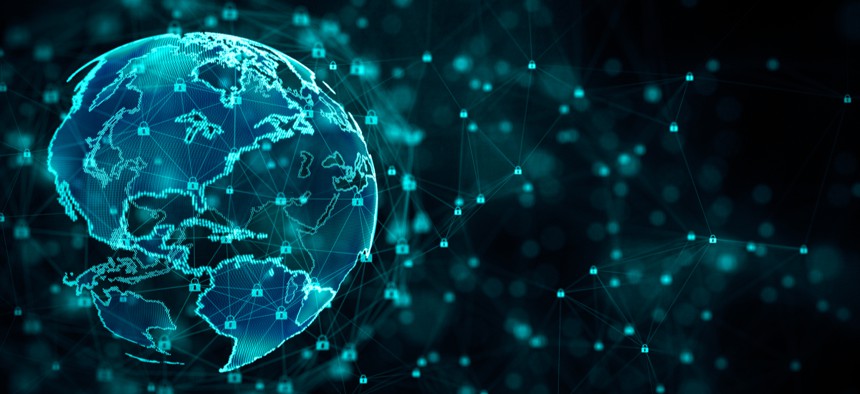Innovation Will Sharpen America’s Tech Edge, Federal Officials Say

KanawatVector/Shutterstock.com
Federal and industry executives weighed in on the greatest threats impacting America’s critical infrastructure.
As threats from foreign adversaries continue to advance across the technological landscape, America’s trailblazing approach to innovation will secure its position as a global leader in cybersecurity and artificial intelligence, federal and industry executives said Tuesday.
“I don’t know if I have enough of a base of knowledge to say whether China’s ahead of us or Russia’s ahead of us,” Christopher Krebs, director of the Homeland Security Department’s Cybersecurity and Infrastructure Security Agency said at an event hosted by the Chertoff Group in Washington. “But I still think that the innovative base and the innovation edge from the United States will keep us at the forefront, if not at the very top.”
Krebs said he looks to the high-performance computing investments being made by the Energy Department as an example of how the nation is “keeping our edge.” The agency recently announced plans to build the world’s fastest supercomputer by 2021, and Energy’s Deputy Undersecretary for Artificial Intelligence and Technology Dimitri Kusnezov discussed the massive undertaking.
“The secretary is fully invested in both AI and supercomputing and we recently announced Aurora, our exascale system at Argonne and Frontier coming in at Oak Ridge National Lab,” Kusnezov said. “These things are very important because they allow us to push learning to extreme scales.”
Energy’s undersecretary said he agreed with Krebs’ notion that America’s edge will continue to come from embracing innovation. In a conversation with reporters after the event, Krebs also noted that when it comes to supercomputers, the cybersecurity approach is unique. He said CISA will work closely with Energy’s chief information officer and team to protect the systems.
“Energy continues to be one of the more forward-leaning partners that we work with,” Krebs said.
But while agencies are working together to boost cyber protections, serious vulnerabilities continue to put the nation at risk. Bill Conner, president and CEO of the network security company SonicWall, said digital threats and exploits are only getting more advanced. In a recent report, his company found a substantial increase in weaponized PDFs being sent largely to recipients in Western nations—most of which seem to be originating in Russia. According to Conner, those threats are still on the rise.
“We are in a cyber arms race, there is no question,” Conner noted. “That said, if you are in an arms race, it's a war, and there’s going to be battles won and battles lost.”
One of the battles of utmost importance for the U.S. to “win,” the experts said, is keeping products connected to the Chinese government—and specifically those built by the Chinese telecommunications equipment company, Huawei—out of America’s impending 5G infrastructure.
“We are about to build out this generational leap in terms of telecommunications and we want to put hardware that manages the control plane of the nation’s communications infrastructure that is working at the behest of an adversarial nation?” Krebs asked. “I just land in a final risk assessment position like ‘I don’t know how we could get here.’”
He said every international NATO partner he speaks to that’s in security services is beginning to recognize the true threat that exists, but some countries are in longer-term financial and economic entanglements that make it difficult to separate their systems from the problematic products. Kusnezov said it’s an issue they’re paying serious attention to at Energy as well.
“I’d like to say ditto with Chris’ passion on this point,” he said. “It’s something we really worry about and we're all going to have to work together to figure out our way through this one.”
Still, Krebs said he’s confident that the U.S. remains as the global market leader in cybersecurity and he doesn’t believe that will change soon. The director is also sure that fortifying strong collaborations with other democracies will help the nation in the fight.
“I talk to the Israelis and the Brits—huge partners—but even as we move back the other way, to Japan, Australia, Singapore—there are a lot of partners out there that want to get in this game together because they are all facing the same digital authoritarian threats,” he said.






